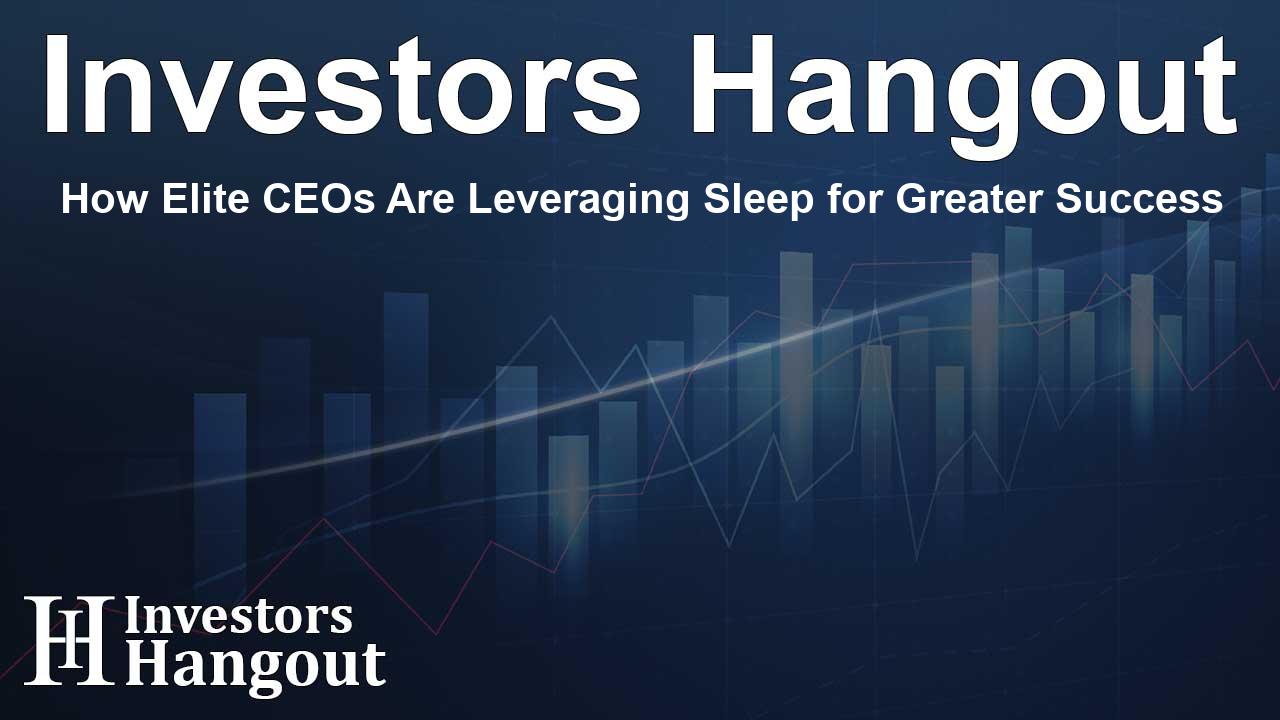How Elite CEOs Are Leveraging Sleep for Greater Success

Revolutionizing Productivity Through Rest
Many top executives are shifting away from the traditional grind of waking up at 4 a.m. and instead embracing a new perspective on productivity: prioritizing sleep. This emerging trend is reshaping the corporate landscape and fueling the ever-expanding sleep economy, estimated to be worth over $500 billion.
Changing Mindsets Regarding Sleep
Leaders in various industries, including those from innovative companies, have started to view sleep not merely as a necessity but as a crucial component of their success. For instance, Peter Barsoom, the CEO of a cannabis company, once thrived on minimal hours of sleep. However, he now understands the value of resting adequately, aiming for six to eight hours of sleep each night.
Sleep as a Status Symbol
There is a growing movement among business leaders who are steering away from a hustle-centered culture towards what some are terming 'sleepmaxxing'. This trend, initially gaining traction on platforms like TikTok, emphasizes the necessity of proper rest, showcasing it as a critical asset for long-term success.
Personal Stories of Transformation
Daniel Ramsey, CEO of MyOutDesk, once embraced the hustle mentality but found that prioritizing sleep significantly improved his leadership capabilities. By tracking his sleep and focusing on recovery, he noted that better rest has allowed him to lead more effectively. Similarly, Arianna Huffington, founder of Thrive Global, speaks openly about her transformation after collapsing from exhaustion years ago. Now, she considers her nighttime routine—a combination of relaxation rituals without technology—as sacred.
The Rise of the Sleep Economy
The global awareness around the importance of sleep has spurred significant market growth. The sleep aids industry is projected to reach an astounding $150 billion by 2034. Devices like the OURA ring, which help track sleep patterns, have become popular, selling millions of units to health-conscious consumers.
Investing in Sleep Optimization
CEOs are making substantial investments in their sleep setups. For instance, Kayla Barnes, the CEO of LYV Wellness, has dedicated over $23,000 to enhance her sleeping environment, investing in high-quality mattresses and blackout shades. On the other hand, Amrita Bhasin, CEO of Sotira, reflects the younger generation's approach by allocating funds each month for sleep-enhancing products. She expresses a firm departure from previous work cultures that equated success with sleepless nights.
Why Sleep Fuels Executive Success
Experts affirm that the science of sleep plays a significant role in high-stakes leadership. Wendy Troxel, a Senior Behavioral and Social Scientist, emphasizes that for those aiming to excel, sleep must be an integral part of their daily routine. Lack of sleep can adversely affect emotional regulation, decision-making, and mental clarity—attributes vital for effective leadership.
Balancing Sleep Tech and Natural Methods
While tracking technology can enhance sleep quality, Troxel warns of possible downsides associated with it, such as 'orthosomnia', which refers to the anxiety of monitoring sleep patterns excessively. Instead, she advocates for simple habits that support restful sleep, like establishing a regular sleep schedule, creating a calming bedtime routine, and ensuring sleep environments are cool and dark.
Practical Sleep Tips for Everyone
For those seeking the advantages of quality rest without breaking the bank, Troxel suggests developing simple habits such as consistent sleep and wake times. Additionally, engaging in relaxing activities before bed, like reading or journaling, can prepare the mind for sleep. Limiting heavy meals and screen exposure in the hours leading up to bedtime is also recommended for a better night’s rest.
Frequently Asked Questions
1. Why are CEOs emphasizing sleep over hustle culture?
Many CEOs recognize that adequate sleep improves decision-making, emotional regulation, and overall productivity, leading to long-term success.
2. What is the 'sleepmaxxing' trend?
Sleepmaxxing refers to the movement where individuals prioritize sleep as a critical factor for performance, moving away from traditional hustle culture.
3. How much is the sleep economy projected to be worth?
The sleep economy is anticipated to reach approximately $150 billion by 2034, driven by increasing awareness and demand for sleep aids and technologies.
4. What are some effective sleep habits recommended by experts?
Experts suggest maintaining a consistent sleep schedule, creating a calming nighttime routine, and optimizing sleep environments.
5. Can sleep tracking technology be harmful?
Over-reliance on sleep tracking can lead to anxiety about rest patterns, a phenomenon known as 'orthosomnia'. It's best to combine technology with natural sleep practices.
About The Author
Contact Henry Turner privately here. Or send an email with ATTN: Henry Turner as the subject to contact@investorshangout.com.
About Investors Hangout
Investors Hangout is a leading online stock forum for financial discussion and learning, offering a wide range of free tools and resources. It draws in traders of all levels, who exchange market knowledge, investigate trading tactics, and keep an eye on industry developments in real time. Featuring financial articles, stock message boards, quotes, charts, company profiles, and live news updates. Through cooperative learning and a wealth of informational resources, it helps users from novices creating their first portfolios to experts honing their techniques. Join Investors Hangout today: https://investorshangout.com/
The content of this article is based on factual, publicly available information and does not represent legal, financial, or investment advice. Investors Hangout does not offer financial advice, and the author is not a licensed financial advisor. Consult a qualified advisor before making any financial or investment decisions based on this article. This article should not be considered advice to purchase, sell, or hold any securities or other investments. If any of the material provided here is inaccurate, please contact us for corrections.
